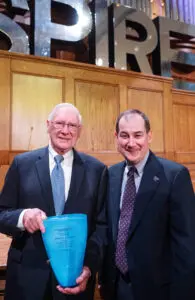Norm Slonaker has three criteria for selecting a philanthropic cause to champion.
“It needs to be relevant, sustainable and have a measurable impact,” he says. “If there is a personal connection, that makes it all the more meaningful.”

Norm Slonaker, left, with Dr. Tim Dellit, Interim CEO, UW Medicine, at Spring Soiree 2023.
For Norm, cancer vaccine research checks every box.
Norm earned a psychology degree from the University of Washington and a law degree from Harvard Law School. He married his wife, Helen, in 1964. She initially aspired to attend medical school before pivoting to computer programming for IBM and then Chase Bank.
“Helen was into computers long before most people,” Norm says.
Living in New Jersey and working in New York, they enjoyed a full, active life together until 1996, when Helen was diagnosed with simultaneous bilateral breast cancer. Because the cancer was stage II and node-negative (the cancer had not spread to the lymph nodes), the Slonakers were hopeful they had seen the last of it after she went through chemotherapy.
Helen’s experience with computers and online research would prove valuable when her cancer returned in 1999. From her breast tissue, the cancer had metastasized into her cortical bone. As she underwent traditional oncology treatments, she began scouring medical journals and internet forums for alternative treatment options.
That’s how Helen learned about cancer vaccines, a then-emerging form of immunotherapy that harnesses the body’s own immune cells to recognize and attack cancer cells. The Slonakers reached out to UW Medicine to find out if there was any value in participating in a cancer vaccine trial.
